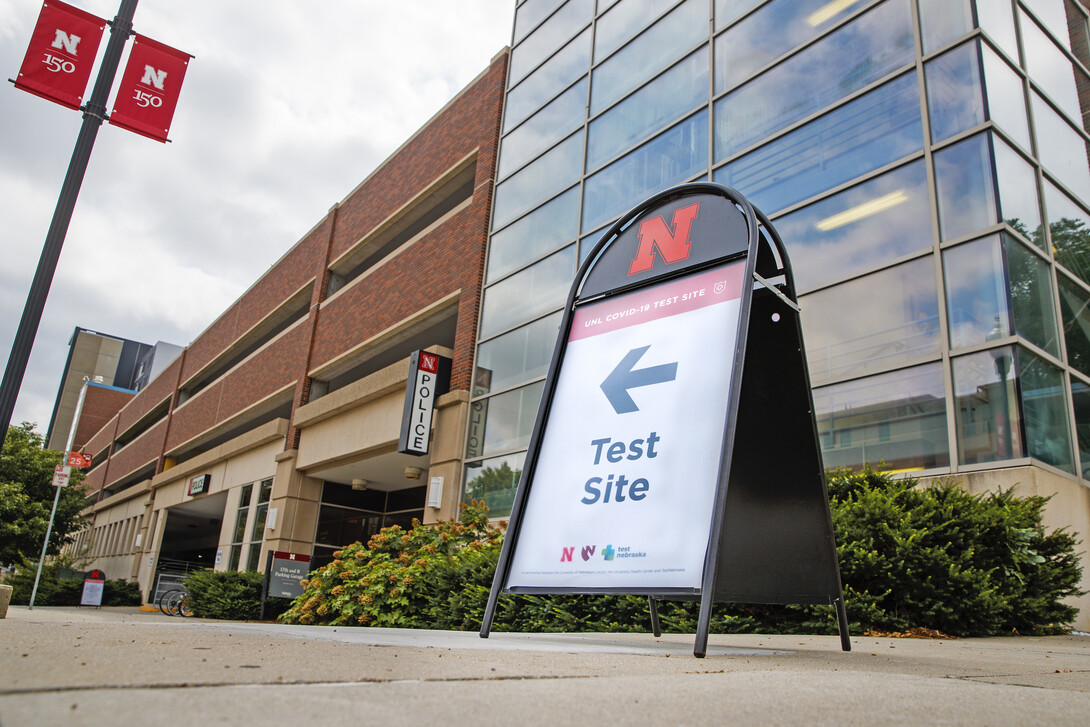
In order to protect your health and the health of others as the fall semester begins, University of Nebraska–Lincoln students and employees should continue to take precautions against COVID-19, including wearing face masks, practicing social distancing, washing hands and using hand sanitizer frequently, refraining from touching your face and avoiding contact with those who are sick.
If you find yourself feeling sick, you may be anxious about what your symptoms could mean. All are encouraged to self-monitor for and report symptoms of COVID-19 by using the 1-Check COVID-19 Screening app for iOS and Android, developed by the University of Nebraska Medical Center.
1-Check COVID-19 enables individuals to privately answer a series of questions and assess their risk of having COVID-19. Then, the app issues a “low risk,” “urgent risk” or “emergent risk” assessment and guides users toward possible next steps specific to their needs.
The following offers additional guidance about what to do if you are sick and how to protect others in your home and community:
What should I do if I’m exhibiting symptoms of COVID-19 or think I’ve been exposed?
Students who are exhibiting symptoms or think they’ve been exposed should stay home and contact their health care provider, the University Health Center or the Lincoln-Lancaser County Health Department Coronavirus Hotline at 402-441-8006.
Any university employee who develops symptoms consistent with COVID-19 or thinks they’ve been exposed should notify their supervisor and leave work immediately or remain at home. Faculty and staff should contact their personal health care provider for a phone assessment or use the 1-Check COVID-19 app.
What should I do if I’ve been exposed to COVID-19?
If you believe you have been exposed to COVID-19, contact your health care provider. If you do not have a provider, you can contact the University Health Center or call 402-472-5000.
Close contact exposure occurs when an individual was within six feet of an infected person for at least 15 minutes, starting from 2 days before illness onset (or, for asymptomatic patients, 2 days prior to positive specimen collection) until the time the patient is isolated. As long as face masks are worn and six feet of physical distancing is maintained, being in the same classroom as someone who tests positive for COVID-19 does not constitute close contact exposure.
When do I need to quarantine?
Quarantine is a public health strategy used to limit contact between someone who may have been exposed to the virus and other members of the community. Quarantine helps prevent the spread of the disease that can occur before a person knows they are sick or if they are infected with the virus without feeling symptoms (asymptomatic).
Symptoms typically develop between two to 14 days after exposure. Students and employees who believe they have come in contact with someone who has COVID-19 and/or been identified during the contact tracing process must quarantine for 14 days from their last contact with the individual, in accordance with CDC guidelines.
Faculty and staff should quarantine at home, students living on campus will quarantine in space identified by the university and case managers will evaluate quarantine needs for students.

Can I be tested for COVID-19?
If, after contacting your health provider (or the University Health Center), you need to get tested for COVID-19, you should pre-register for a same-day appointment at the on-campus testing site. More information and appointment registration for testing can be found at the University of Nebraska–Lincoln COVID-19 website..
If you are unable to use the free on-campus COVID-19 testing site, there are additional testing sites in the Lincoln area. Each site varies and appointments and payment may be required. You are encouraged to contact the testing site to confirm what you will need to do prior to receiving a test.
Same-day appointments are available at the University Health Center. Visit the University Health Center website for details, or call 402-472-5000.
Visit the TestNebraska website for locations and hours of other sites available in Lincoln.
What should I do if I test positive?
Students who test positive or are exhibiting symptoms of COVID-19 should immediately contact the University Health Center or primary care provider. Students who test positive outside of the university testing site should promptly notify the University of Nebraska–Lincoln Public Health Advocacy Team via email or via text message at 402-266-6865.
See the Positive Case Reporting page for more detail on reporting a case.
When do I need to isolate?
Students and employees who test positive for COVID-19 or are presumed positive will need to isolate for at least 10 days since symptom onset and must have an improvement in symptoms and be fever free for 24 hours without taking fever-reducing medication before returning to on-campus work or classes. Students and employees who are experiencing symptoms and awaiting test results will need to isolate immediately.
How can I care for myself at home?
When caring for yourself at home, monitor your symptoms carefully and if they get worse, call your health care provider. Be sure to get plenty of rest, stay hydrated, cover your cough and sneezes and wash your hands frequently. Stay separated from others as much as you can; avoid sharing items such as dishes, towels and bedding; and use a separate bathroom. Wear a face mask if you need to be around others in your home. Clean and disinfect all frequently touched surfaces daily such as doorknobs, handles and tabletops.
For the latest updates and information on Nebraska’s response to the COVID-19 pandemic, including FAQs, visit the university’s COIVD-19 website.







